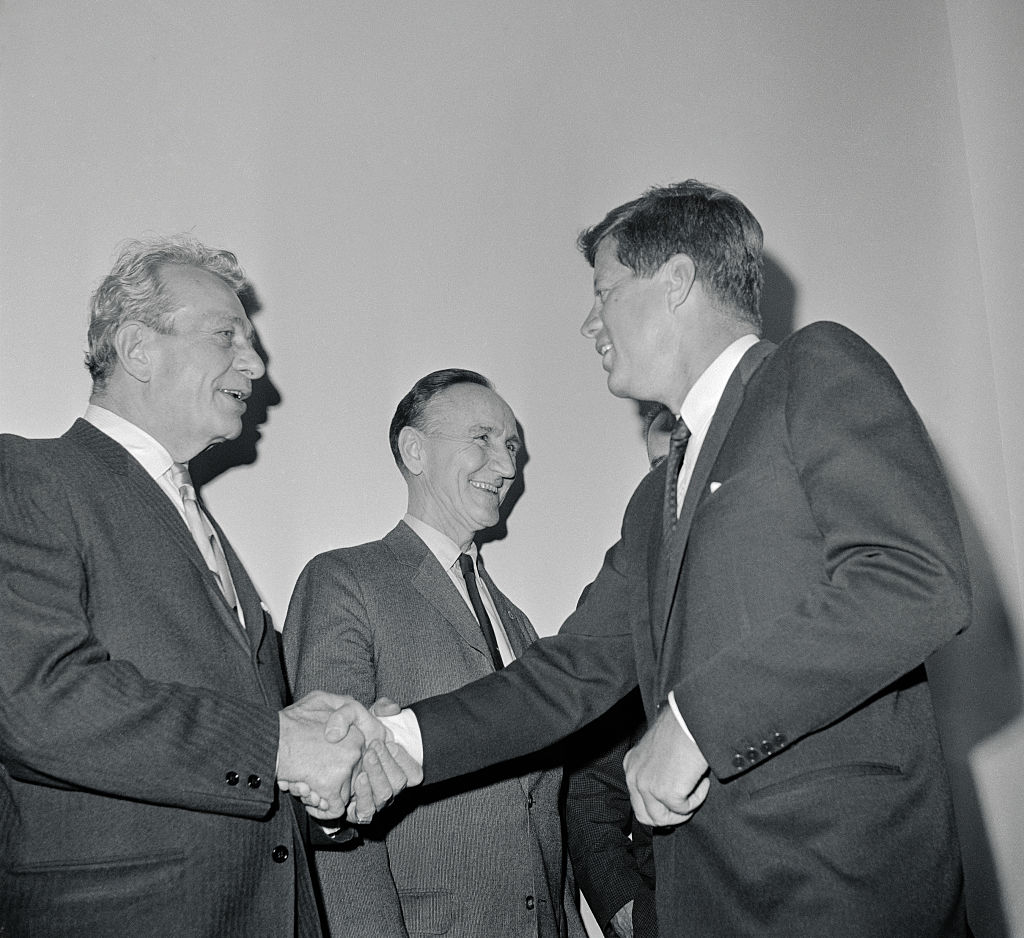House Speaker Kevin McCarthy finally bowed to the obvious on Saturday and allowed his chamber to vote on a stop-gap spending bill that did not include spending cuts or policy changes—what's known as a clean continuing resolution (CR) in Capitol Hill lingo—in order to keep the government open. Doing so could cost McCarthy his speakership, as far-right rebels have spent weeks threatening that passing such a bill with Democratic votes could prompt them to offer a motion to remove McCarthy from the job.
The situation underscores both the difficulty of McCarthy's job with a fractious caucus and a razor-thin majority, but also how governing in a bipartisan way is considered tantamount to treason. This has left Congress on the brink of total paralysis.
But it wasn’t always this way. In fact, the hyper partisanship that grips American politics today is a relatively recent development.
Ironically, the 1960s—one of the most divisive and tumultuous decades of the last century—was a golden era for compromise in Congress.
During that decade, two remarkable Senate leaders—Majority Leader Mike Mansfield (D-Mont.) and Minority Leader Everett Dirksen (R-Ill.)—perfected the art of bipartisan governance and passed some of the most significant legislation in American history. The two men were driven by a deep commitment to civility, self-restraint, candor, and respect for the institution they jointly led—a commitment that could do much to repair our broken legislative branch today. An example of their work offers an illustration of how Congress should work—one that unfortunately exposes how broken the legislative branch is today.
Dirksen, a would-be actor and former congressman, who became one of the Senate’s great orators and legislative dealmakers, joined the chamber in 1950, while Mansfield, a laconic former college history professor and one-time copper miner, moved from the House to the Senate in 1952. By 1961 their colleagues had tapped the two men to lead their respective Senate caucuses.
Read More: Approval of Congress Hits Near-Record Low as Country Stumbles Toward Shutdown

Both men were certainly partisans with Dirksen’s fundamentally conservative nature preventing him from supporting much of President John F. Kennedy’s domestic legislative agenda. Yet, each also viewed governance—and the compromise and conciliation often required—as a responsibility of leadership. Mansfield’s modesty and fairness combined with Dirksen’s persuasion and dealmaking to frequently allow the leaders to overcome the strongest ideological elements of their own parties, causing Mansfield to later reflect that “you get a partner like Dirksen and form a dream relationship once in a century.”
In 1963, they confronted an immense legislative challenge. The Senate was deeply divided over Kennedy’s proposed nuclear test ban treaty with the Soviet Union. Most Senate Republicans opposed reaching any accommodation with the Soviets and many powerful Senate Democrats, including the influential Armed Services Committee Chairman Richard Russell of Georgia, agreed.
When, after months of negotiations, Kennedy presented the treaty to the Senate it was far from certain it would survive, especially since ratification required two-thirds support. Fortunately for Kennedy, Dirksen and Mansfield seemed to embrace the sage advice of one-time Secretary of State Dean Acheson. "The central question is not whether Congress should be stronger than the Presidency, or vice versa,” Acheson said, but how both could be strengthened to do “pressing work,” both separately and together.
While Dirksen warned that “every word and every line and every phase of the treaty must be carefully examined for its present and future effect,” that was far from a declaration of war. This was crucial, because as Mansfield admitted both publicly and privately to Kennedy and Dirksen, Republican votes would decide the fate of the treaty. The majority leader hoped that “Senator Dirksen and I will be working shoulder-to-shoulder on this one when the chips are down.”
Far from attacking the minority party, Mansfield declared that he had “every confidence” in their fairness. He trusted that Republicans would set politics aside and focus on “what will be good for their country.” The statement was vintage Mansfield, downplaying partisanship and assuming the best intentions of the other party, particularly Dirksen. This stance helped engender trust and build durable working relationships.
As the debate began, Dirksen said he was detecting a “pattern of fear” about the ramifications of the treaty as he talked to his Republican colleagues. He suggested to Mansfield that they “ought to get on our horses and go down to the White House” to suggest to the president that he work to understand and address this fear.
Kennedy was initially reluctant to agree to the visit, not wanting to elevate Dirksen, given his opposition to the president’s domestic agenda. But Mansfield, always focused on what it took to win in the Senate, pressed the White House, and the meeting was scheduled for the same day Senate floor debate began.
“Now this is a little presumptuous on my part,” Dirksen warned Kennedy as he began reading aloud the draft of a letter he was hoping the president would agree to send to the Senate. The proposed letter offered “unqualified and unequivocal assurances” that the United States would pursue underground nuclear testing, maintain a posture of readiness to resume atmospheric testing, enhance detection capabilities to ensure the Russians were not cheating, and maintain a robust weapons development capability. He saw such promises as key to securing votes from his side of the aisle.
Kennedy readily agreed to send the letter, and the three men spent the rest of the almost hour-long meeting strategizing about where the votes stood with senators of both parties. After the meeting, Dirksen immediately announced he would support the treaty and resist efforts to amend it or attach reservations.
The letter crafted by Dirksen and sent by the president gave the minority leader crucial arguments to use to win over fellow Republicans. He proved able to secure support from 25 of them, representing an ideological cross section of the GOP, including midwestern conservatives and northeastern liberals. All Democrats supported the bill save for some conservative southerners and maverick Senator Frank Lausche of Ohio.
When the final vote of 80-19 was announced, Mansfield stood, looked at the Republican leader, and said, “I salute a great American.”

Kennedy considered the treaty the supreme foreign policy accomplishment of his presidency, made possible only because a Republican leader set aside partisan considerations and helped round up the votes.
Read More: The Freedom Caucus Has Taken the House Hostage. Their Demand? Kevin McCarthy's Spine
Ratification of the Test Ban Treaty was but one example of a highly fruitful legislative partnership that helped pass, among other landmark legislation, the 1964 Civil Rights Act and the 1965 Voting Rights Act. The key was the Democratic majority listening to Dirksen’s advice and requests, and working to bring him into the fold. Crucially, the minority leader didn’t see legislating as a chance to score political points. He had no interest in “owning the libs,” to use the language of today. Rather, on many issues—even those that provided political victories for Kennedy or his successor Lyndon B. Johnson—Dirksen could place national interest above partisan advantage.
Exposing how different politics are today, McCarthy faces the looming specter of a coup should he even grudgingly agree to a bipartisan deal to keep the government open—an absolute necessity. Yet, the speaker has also operated in almost the opposite fashion of Dirksen. He hasn’t even tried to find common cause with the other party, despite confronting divided government. At every turn, he has looked to appease the right wing of his party and pass things with only Republican votes. When he was forced to cut a deal with President Biden to raise the debt ceiling, he quickly reneged on the terms when the fringe of his caucus rose up in protest.
It seems clear, however, that Dirksen’s methods offer the speaker a way out of his seemingly impossible predicament. Democrats might even save him from a coup. The key is deploying Dirksen's way of thinking and prioritizing what is good for the country over what is good for McCarthy’s party or his own political future. Unfortunately, in 2023 this seems little more than a naïve hope—even as it remains the best path to a government that functions in deeply divided times.
Marc C. Johnson is a fellow at the Mansfield Center at the University of Montana. His latest book is Mansfield and Dirksen: Bipartisan Giants of the Senate. Made by History takes readers beyond the headlines with articles written and edited by professional historians. Learn more about Made by History at TIME here.
More Must-Reads from TIME
- Donald Trump Is TIME's 2024 Person of the Year
- Why We Chose Trump as Person of the Year
- Is Intermittent Fasting Good or Bad for You?
- The 100 Must-Read Books of 2024
- The 20 Best Christmas TV Episodes
- Column: If Optimism Feels Ridiculous Now, Try Hope
- The Future of Climate Action Is Trade Policy
- Merle Bombardieri Is Helping People Make the Baby Decision
Write to Marc C. Johnson / Made by History at madebyhistory@time.com
